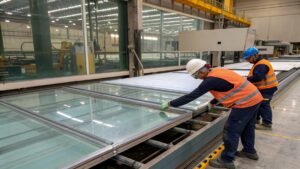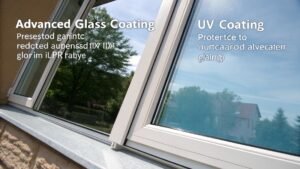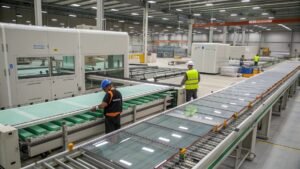Struggling with poor glass performance and high maintenance costs? Looking for ways to enhance glass properties and durability? Glass coating technology offers an innovative solution.
Glass coating is a wet processing technique that applies nano-scale functional materials onto glass surfaces. This creates specialized layers that enhance properties like UV protection, heat insulation, and scratch resistance while maintaining transparency.

As someone who has spent years developing coating equipment for the glass industry, I’ve seen firsthand how this technology transforms ordinary glass into high-performance materials. Let’s explore what makes these coatings so valuable.
How long does glass coating last?
Worried about investing in coating technology only to have it fail prematurely? Concerned about long-term durability? Understanding coating lifespan helps make informed decisions.
Industrial glass coatings typically last 5-10 years when properly applied and maintained. Durability depends on coating type, application quality, environmental conditions, and maintenance practices.

Through my experience with coating production lines, I’ve identified several key factors affecting coating longevity1:
Application Process
The coating’s lifespan heavily depends on proper application:
- Surface preparation: Thorough cleaning removes contaminants
- Environmental control: Temperature (15-28°C) and humidity (40-50%)
- Precise coating thickness: Typically 15-25g/m² wet coating
- Proper curing: Controlled heating/drying ensures optimal bonding
Quality Control
Manufacturing standards significantly impact durability:
- Coating uniformity within ±5%
- Surface hardness ≥4H
- Automated process control
- Regular quality testing
- Strict environmental monitoring
Environmental Factors
External conditions affect coating performance:
- UV exposure levels
- Temperature fluctuations
- Chemical exposure
- Physical wear
- Cleaning methods
Proper industrial application using advanced coating equipment ensures maximum coating longevity.
Is glass coating better than ceramic?
Trying to choose between glass and ceramic coatings? Wondering which offers better performance and value? Let’s compare their key characteristics.
Glass coatings generally offer better transparency and smoother surfaces than ceramic coatings, while providing comparable protection. Their liquid application process allows for more uniform coverage and better adhesion to glass substrates.

From our manufacturing experience, glass coatings show distinct advantages:
Performance Characteristics
Glass coatings excel in several areas:
- Higher transparency (>73% visible light transmission)2
- Better UV protection (>94% UV blocking)
- Excellent IR rejection (>95% IR blocking)
- Smooth, uniform surface finish
- Compatible with various glass types
Application Process
The wet coating process offers benefits:
- More uniform coverage
- Better control over thickness
- Fewer application defects
- Lower processing temperatures
- More cost-effective production
Functional Properties
Glass coatings provide multiple benefits:
- Enhanced scratch resistance3
- Improved chemical resistance
- Better weather resistance
- Self-cleaning properties4
- Anti-reflection capabilities
Our coating equipment maximizes these advantages through precise application control.
What are the benefits of glass coating?
Looking to improve glass performance but unsure of the real benefits? Wondering if the investment in coating technology is worthwhile? Here’s what you need to know.
Glass coating provides multiple benefits including UV and IR protection (>90% blocking), improved durability (≥4H hardness), enhanced optical properties, and reduced maintenance requirements. It also enables specialized functions like self-cleaning and anti-reflection.

Based on our extensive industry experience, glass coating offers significant advantages:
Performance Benefits
- UV/IR Protection5: Blocks >90% of harmful radiation
- Optical Enhancement: Maintains high visible light transmission
- Thermal Control: Reduces heat transfer
- Durability: Surface hardness ≥4H
- Weather Resistance: Enhanced environmental protection
Economic Benefits
- Reduced Maintenance Costs6
- Extended Glass Lifespan
- Lower Energy Consumption
- Increased Property Value
- Enhanced Product Value
Application Versatility
Suitable for multiple sectors:
- Solar Glass7: Improves efficiency by 2.5%
- Architectural Glass: Enhanced thermal performance
- Decorative Glass: Aesthetic improvements
- Specialized Applications: Custom solutions
Can glass coating prevent scratches?
Concerned about glass surface damage? Wondering how well coatings protect against scratches? Let’s examine the real protective capabilities.
While glass coating significantly improves scratch resistance (achieving ≥4H hardness), it doesn’t make glass completely scratch-proof. It provides enhanced protection against everyday wear but can still be damaged by sharp objects or extreme force.

Through our coating technology development, we’ve learned important aspects about scratch protection8:
Protection Level
Coatings provide graduated protection:
- Resistant to light abrasion
- Protects against daily wear
- Reduces cleaning-related scratches
- Maintains clarity longer
- Improves surface hardness to ≥4H9
Limitations
Understanding boundaries is important:
- Not completely scratch-proof
- Can be damaged by sharp objects
- Extreme force can penetrate coating
- Regular maintenance still required
- Periodic reapplication may be needed
Our coating equipment ensures optimal protection through precise application and curing control.
Conclusion
Glass coating technology delivers significant improvements in glass performance, durability, and functionality. When properly applied using advanced industrial equipment, these coatings provide long-lasting benefits across multiple applications from solar to architectural glass.
-
Understanding the factors influencing coating longevity can help improve product durability and performance in various applications. ↩
-
Understanding the benefits of higher transparency can help you appreciate the value of glass coatings in various applications. ↩
-
Exploring enhanced scratch resistance will reveal how it contributes to the durability and longevity of glass products. ↩
-
Discovering the advantages of self-cleaning properties can lead to insights on maintenance and convenience in glass applications. ↩
-
Explore how UV/IR protection can enhance glass performance and safety, making it a valuable investment for various applications. ↩
-
Learn how glass coating can significantly lower maintenance expenses, providing long-term savings for property owners. ↩
-
Discover the benefits of solar glass in improving energy efficiency and its impact on sustainability in the industry. ↩
-
Explore this link to discover advanced techniques and technologies that enhance scratch protection in coatings, ensuring durability and longevity. ↩
-
Understanding surface hardness is crucial for evaluating coating performance. This resource will clarify its significance and benefits. ↩





